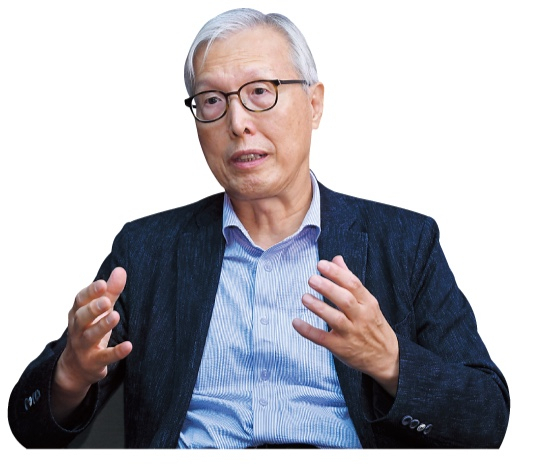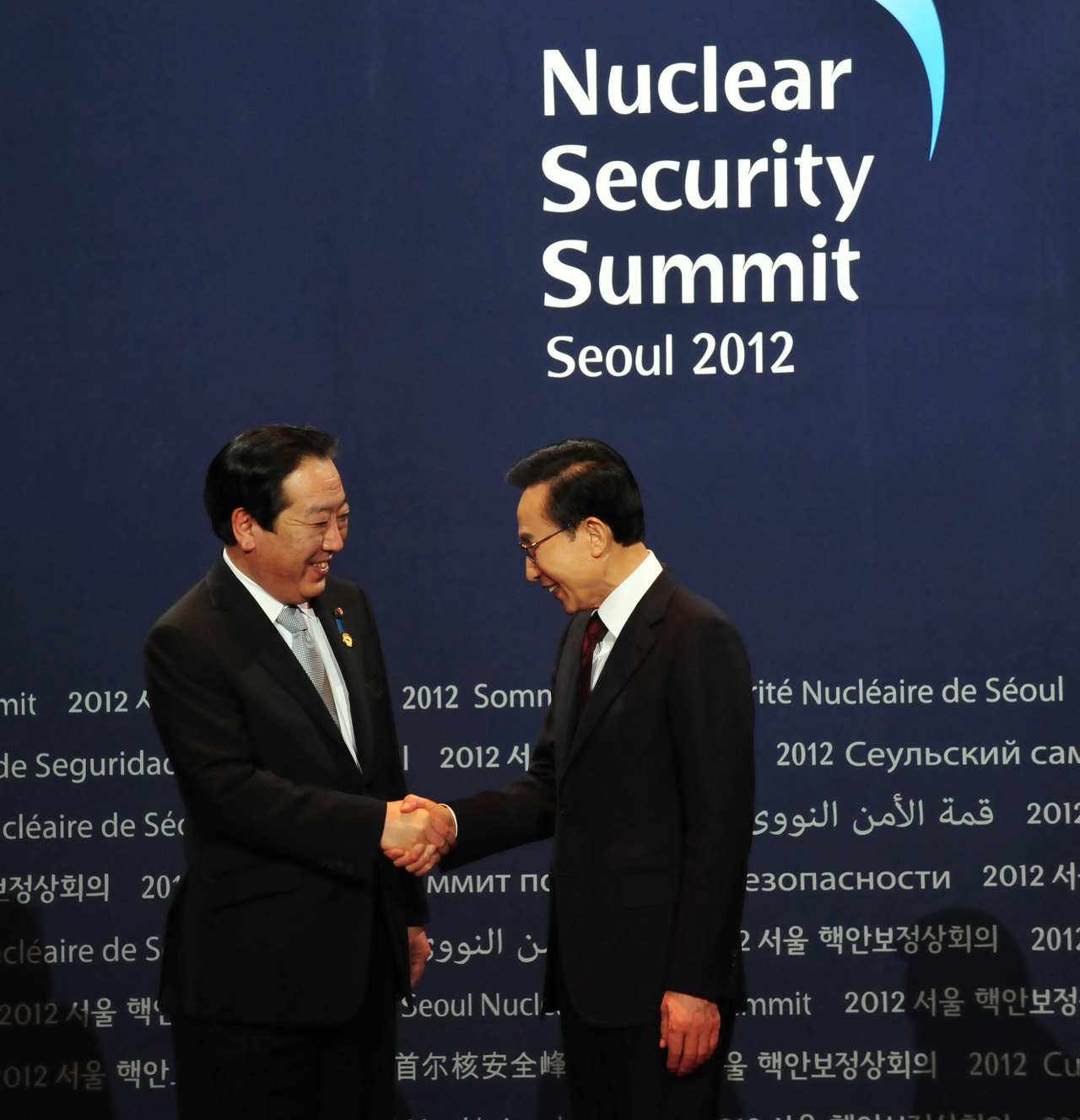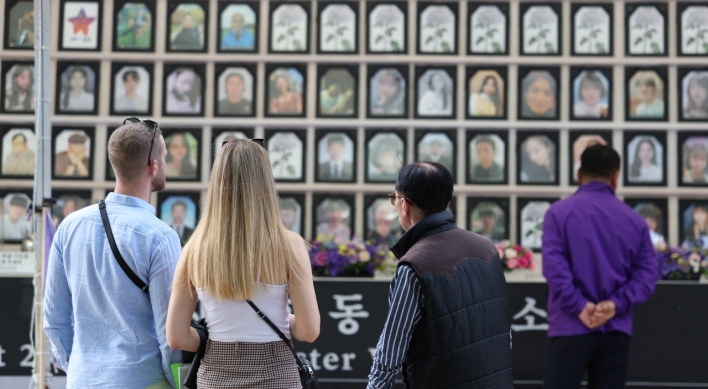[Top Envoy] ‘Don’t look back anymore’: former envoy on S. Korea-Japan thaw
Settling historical disputes needs diplomacy, not court rulings, says Shin Kak-soo
By Choi Si-youngPublished : Sept. 20, 2023 - 16:45

The Korea Herald publishes a series of interviews with South Korea’s former and current top diplomats who have played a central role in shaping the country’s foreign policies to confront the complexities of an increasingly contested international order while managing its historical relationships with allies and neighbors, for lasting peace beyond the Korean Peninsula. This is the first installment. -- Ed
When Shin Kak-soo, South Korea’s former ambassador to Japan, supported efforts for a summit between the Korean and Japanese leaders in Kyoto in December 2011, the career diplomat, just seven months into the job, did not expect to wait 12 years to see the next one.
“The talks didn’t go well. Seoul was doubling down on resolving disputes involving Japan’s 1910-45 colonial rule of the peninsula. Not only wasn’t Tokyo as receptive to the idea as Seoul wanted, but the dialogue fell apart,” the envoy said, recalling his two-year stint as ambassador, a post he took after serving as vice foreign minister. He left the Foreign Ministry in 2017.
In a recent interview with The Korea Herald, the 68-year-old former diplomat said judicial activism over settling the issues of colonial-era sexual slavery and forced labor had been the “start of what was to follow.”

Decision that changed everything
Four months before the Kyoto talks, the Constitutional Court of Korea backed an unprecedented ruling, calling out the Korean government over inaction that avoided engaging with Japan to compensate the victims of sexual slavery, known as comfort women.
Seoul and Tokyo reached a 1965 pact that normalized ties following Japan’s colonial rule. The agreement did not explicitly discuss sexual slavery but included a package of economic aid. Korea then used it to grow its economy and companies. Japan says the pact prevents Korea from raising the issue of compensation again.
At the Kyoto dialogue, then-President Lee Myung-bak demanded Japanese Prime Minister Yoshihiko Noda come up with a plan that could settle the 2011 ruling by the Constitutional Court. Noda was reluctant to give a direct answer, and it was clear why, Shin said.
“Recognizing the decision meant acknowledging that the 1910-45 occupation was illegal. That’s not something the Japanese would accept,” Shin noted.
“Diplomatic matters require room for compromise,” the kind of tolerance that allows parties involved in conflict to agree to disagree, Shin said. The 1965 pact is an example, Shin added. He also spoke to a later 2015 deal on the sexual slavery issue that Lee’s successor reached with Japan as another example.
The deal set up a fund financed by Japan to pay the victims, and asked then-Japanese Prime Minister Shinzo Abe to deliver an apology. The deal did not discuss whether the responsibility for such sexual slavery was legal or moral. Korea later dissolved the fund, saying the agreement had not consulted the victims.
“That was a mistake because that was potentially the best deal out there. Korea had just thrown it out the window,” Shin said.
Judicial overreach again
A 2018 ruling by Korea’s Supreme Court that held Japanese companies liable for damages for forcing Koreans to labor for them during the colonial rule dealt an even bigger blow to ties, according to Shin. Judicial restraint, such as recommending reconciliation, should have taken place instead, more so on this matter than anything else, Shin said.
The former ambassador was referring to the fact that the Korean government had already officially settled the matter through the 1965 agreement, a move that was made public in 2005 and later prompted legislation in 2007 to compensate the victims, who received payments until 2015.
“The top court says that’s not right all of sudden. So where do we go from there?” Shin said. A government remedy to the problem was nowhere to be found until March this year, a year after President Yoon Suk Yeol came to power, pledging closer Seoul-Tokyo ties.
The March deal on forced laborers centered on Seoul backing a foundation financed by South Korean companies to compensate the victims, while awaiting potential apologies from the Japanese firms. The settlement is “something a leader should come up with to find the middle ground” between the 2018 ruling and 1965 agreement, according to Yoon, a conservative leader who was serious about mending ties.
In May, Japanese Prime Minister Fumio Kishida reciprocated Yoon’s trip to Tokyo two months before, with the two leaders vowing friendlier ties and officially resuming their shuttle diplomacy, a regular meeting between them. The 12-year hiatus prompted by the collapse of the Kyoto talks came to an end.
But the March resolution is still contentious, with some of the victims refusing to accept money because it is coming from Korean companies that benefited from the 1965 agreement. Steel giant Posco, for example, has already donated about $3 million to the fund. Compensation should come from Japanese firms, along with a sincere apology, according to the victims.
The March deal is also facing some resistance from the courts, as they have so far blocked the government’s legal action to press ahead with compensating the family members of victims protesting the deal. The courts cited the victims’ refusal to accept the resolution in their decisions. A separate hearing is expected to rule on the judgment. The Yoon government is determined to have courts understand its March proposal.
Taking steps forward
But the administration is facing fresh pressure on another front involving Japan. Yoon’s opposition is leading a campaign to have the government withdraw its decision not to oppose the Japanese government’s push to discharge more than 1.34 million tons of radioactive wastewater from the destroyed Fukushima Daiichi nuclear power plant.
The discharge into the Pacific Ocean, which began in late August after the International Atomic Energy Agency ruled its health and environmental impact “negligible,” is part of Tokyo’s plans to decommission the facility, which was hit by a 9.0 magnitude earthquake and tsunami in 2011. Japan maintains that radioactivity levels in the released wastewater will be made safe enough by filtering and dilution processes.
Critics, however, disagree, saying that the long-term effects are unknown and still being debated. Shin does not see it that way. Shin took office in May 2011, two months after the earthquake and tsunami, and stayed in Japan for another two years. He underscored the importance of “what has transpired since then.”
“The moment the tsunami hit the Fukushima plant, there was a burst of radioactive water (and the) radioactive levels were off the charts. Over a decade passed and we’re still okay here and there (in Japan),” Shin said, dismissing the issue and urging the Yoon government to accelerate efforts for a lasting sound partnership.
In August, the Yoon government shook hands on a security pledge with the US, Korea’s biggest ally, and Japan. The unprecedented commitment followed Seoul’s pact with Washington in April that gives Korea a bigger say in the way the US uses its nuclear umbrella. The strategy, known as extended deterrence, is aimed at curbing North Korea’s growing nuclear threats.
The three-way cooperation capped a yearslong push by policymakers in the three nations to jointly curb North Korea’s aggression. Until then, disagreements over historical disputes had stood in the way.
“The steps and leaps Korea will be taking from now on are really important to flesh out the August agreement. Institutionalizing it is key,” Shin said of the trilateral partnership, which he called an “undisputed priority” for Seoul to not only survive but thrive.
Tension with Japan, which could flare up as the two nations work together, should be handled separately if it involves revisiting their shared history, Shin added, referring to a joint committee led by Korean and Japanese historians. The group, which published its initial findings in a report in 2005 and another in 2010, has yet to resume work on a third report.
“But don’t look back anymore. It is high time to forge a viable and effective partnership with Japan to cope with the uncertain and unstable strategic environment in the Indo-Pacific region,” Shin said of Yoon and his successors.

About Shin
Shin Kak-soo was a career diplomat who served as ambassador to Japan, a two-year post that capped his 37 years at the Foreign Ministry in 2013. He was previously vice foreign minister, ambassador to Israel and deputy ambassador to the UN. In the earlier years of his career, Shin was director of Japanese affairs and named director-general of overseeing treaties. He is currently a senior adviser at SHIN & KIM, a local law firm founded by a different Shin.







![[Music in drama] Rekindle a love that slipped through your fingers](http://res.heraldm.com/phpwas/restmb_idxmake.php?idx=644&simg=/content/image/2024/05/01/20240501050484_0.jpg&u=20240501151646)


![[New faces of Assembly] Architect behind ‘audacious initiative’ believes in denuclearized North Korea](http://res.heraldm.com/phpwas/restmb_idxmake.php?idx=644&simg=/content/image/2024/05/01/20240501050627_0.jpg&u=20240502093000)








